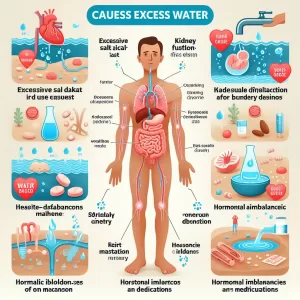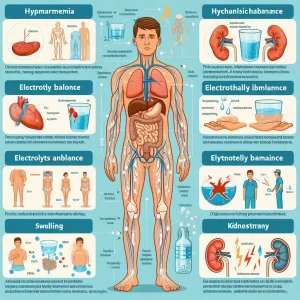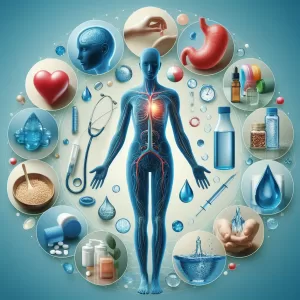In a world where the importance of hydration is constantly emphasized, few people are aware of the potential dangers of excess water in the body. This condition, known as hyponatremia, occurs when the sodium level in the blood drops dangerously low due to overhydration. This condition can have serious health consequences, ranging from fatigue and muscle cramps to more severe problems such as confusion and seizures. It is therefore essential to understand the causes of excess water in the body, its effects on health and the measures to take to avoid it. In this article, we will explore these aspects in detail, offering practical advice for maintaining a healthy fluid balance and promoting overall well-being.
I. Causes of excess water in the body:

1. Overhydration:
Overhydration occurs when water intake exceeds the body’s ability to eliminate it. This can occur when drinking too much water in a short period, often during sporting activities or in response to a false sensation of thirst. Dilution of electrolytes, particularly sodium, leads to an imbalance that can affect cellular and neurological functions.
2. Kidney Disorders:
The kidneys play a crucial role in regulating fluid balance by filtering excess fluid and waste products from the blood. Kidney diseases, such as chronic kidney failure, can reduce the kidneys’ ability to remove water, leading to fluid buildup in the body.
3. Heart failure:
When the heart is weakened and cannot pump blood efficiently, the body may respond by retaining water and sodium to increase blood volume. This can lead to fluid overload and symptoms such as edema (swelling) and dyspnea (difficulty breathing).
4. Liver Cirrhosis:
Cirrhosis, a chronic liver disease, can lead to fluid and sodium retention. Impaired liver function affects protein production and fluid regulation, leading to fluid accumulation in the abdomen (ascites) and other parts of the body.
5. Medications:
Certain medications can influence fluid balance and sodium levels. Diuretics, for example, increase water and sodium excretion, but inappropriate or excessive use can lead to dehydration or hyponatremia. Other medications, such as anti-inflammatories and antidepressants, can also affect water regulation.
6. Syndrome of inappropriate antidiuretic hormone secretion (SIADH):
This syndrome is characterized by excessive secretion of antidiuretic hormone (ADH), which promotes fluid retention in the kidneys. This can result from certain illnesses, medications, or central nervous system disorders, leading to hyponatremia and overhydration.
7. Intense Exercise:
During strenuous physical activities, sweating can lead to significant loss of water and electrolytes. If a person drinks excess water to compensate without restoring electrolytes, it can dilute the sodium in the blood and cause overhydration.
8. Pregnancy:
Hormonal and physiological changes during pregnancy can affect water and electrolyte regulation, increasing the risk of fluid retention and edema, particularly in the legs and feet.
9. Low Sodium Diet:
Insufficient sodium intake can disrupt the balance between sodium and water in the body. If water intake remains high while sodium intake is low, this can lead to electrolyte dilution and hyponatremia.
10. Hormonal Changes:
Hormonal fluctuations, especially during menopause, can affect water and sodium regulation. These changes can lead to fluid retention and electrolyte imbalance in some women.
II. Consequences of excess water in the body:

Excess water in the body can lead to a series of consequences due to the impact on fluid and electrolyte balance. Here is how this excess creates these effects:
1. Swelling:
When the body retains too much water, it can accumulate in the tissues, leading to edema. This often manifests as swelling of the hands, feet, and face. This phenomenon is due to osmotic pressure which attracts water towards the interstitial spaces.
2. Fatigue:
Hyponatremia, or the decrease in sodium in the blood due to dilution by excess water, can disrupt the function of cells, including muscle and nerve cells. This can lead to feeling tired and lethargic.
3. Muscle cramps:
Sodium plays a crucial role in the transmission of nerve signals and muscle contraction. A decrease in concentration can cause muscle cramps and weakness.
4. Confusion and seizures:
Hyponatremia also affects the brain. It can cause swelling of the brain cells, leading to neurological symptoms such as confusion and, in severe cases, seizures.
5. Increased blood pressure:
Excess fluid increases blood volume, which can put additional pressure on blood vessel walls, leading to elevated blood pressure.
6. Headaches:
Fluctuating sodium levels and increased pressure on the brain from excess fluid can cause headaches and migraines.
7. Difficulty breathing:
Pulmonary edema, where excess fluid builds up in the lungs, can make breathing difficult and cause you to feel short of breath.
8. Increased Risk of Urinary Tract Infections:
Diluted urine has a reduced ability to eliminate bacteria, thereby increasing the risk of urinary tract infections.
9. Hormonal Imbalance:
Hyponatremia can affect the release and regulation of hormones, disrupting various bodily functions, such as growth, metabolism, and reproduction.
10. Kidney failure:
Extreme fluid overload can overtax the kidneys, reducing their ability to filter blood and remove excess fluid, potentially leading to acute kidney failure.
It is essential to maintain an adequate fluid balance to avoid these consequences and to consult a doctor if symptoms of excess water appear.
III. Solutions to prevent and treat excess water in the body:

1. Balance fluid intake:
Maintaining optimal fluid balance is essential to prevent problems related to excess water in the body.
Here’s how this balance can help solve the problem of excess water in the body:
– Listen to your body:
One of the best indicators of your water needs is how thirsty you feel. Drink when you are thirsty and stop when you feel hydrated. Your body is designed to signal you when it needs more fluids.
– Adapt your consumption to your activity:
If you’re active or working out, you’ll need more water to compensate for fluid loss from sweating. Be sure to drink before, during, and after exercise to maintain adequate hydration.
– Consider environmental conditions:
Hot or humid climates can increase your water requirement due to increased sweating. Likewise, if you are at altitude, your body loses more moisture and requires additional hydration.
– Monitor the color of your urine:
Clear or straw-colored urine is generally a good indicator of adequate hydration. If your urine is dark, it may mean you need to drink more water.
– Avoid excesses:
While it’s important to stay hydrated, it’s equally crucial to avoid drinking excess water, which can lead to electrolyte dilution and fluid imbalances.
– Meet individual needs:
Water needs may vary depending on age, gender, weight, health, and other factors. Consult a healthcare professional for personalized recommendations on your fluid intake.
By following these guidelines and balancing your fluid intake, you can help prevent excess water in the body and maintain optimal health.
2. Monitor your diet:
A balanced diet plays a crucial role in managing fluid balance and preventing excess water in the body.
Here’s how carefully monitoring your diet can help resolve excess water in the body:
– Include foods high in sodium:
Sodium is an essential electrolyte that helps regulate fluid balance in the body. By eating foods with an adequate amount of sodium, you can help maintain this balance. Sources of sodium include olives, pickled vegetables, certain cheeses, and cured meats. However, it is important not to consume excess sodium, as it can lead to other health problems.
– Include sources of potassium:
Potassium works in tandem with sodium to maintain fluid balance and support healthy cell function. Foods high in potassium, such as bananas, spinach, sweet potatoes, and avocados, can help prevent fluid retention by regulating sodium levels.
– Limit diuretic foods and drinks:
Certain foods and drinks, such as coffee, tea, and alcoholic beverages, have a diuretic effect, meaning they increase urine production. Excessive consumption of these substances can disrupt fluid balance and contribute to dehydration. It is therefore advisable to consume them in moderation.
– Hydrate with water-rich foods:
Fruits and vegetables with a high water content, such as cucumbers, melons, oranges, and tomatoes, can contribute to your overall fluid intake while providing essential nutrients.
– Avoid foods that are too salty:
Although sodium is necessary, excessive consumption can lead to water retention. So it’s important to watch your intake of processed and packaged foods, which are often high in sodium.
By balancing your sodium and potassium intake and choosing foods that support a healthy fluid balance, you can help prevent excess water in the body and maintain good overall health.
3. Stress management:
Stress management plays a crucial role in regulating the body’s fluid balance and preventing excess water.
Here’s how it can help solve this problem:
– Hormonal regulation:
Chronic stress can disrupt the secretion and balance of hormones, including those that regulate fluid retention, such as aldosterone and antidiuretic hormone (ADH). By controlling stress, you can help normalize the levels of these hormones and maintain proper fluid balance.
– Reduction in water retention:
Stress management techniques, such as meditation and yoga, promote relaxation and can reduce the production of stress hormones like cortisol. High cortisol levels can lead to water retention. By decreasing cortisol levels, you can help prevent excess fluid buildup in the body.
– Improved kidney function:
Stress can negatively affect kidney function, which is essential for regulating fluid balance. Relaxation and stress management practices can support kidney health and improve the excretion of excess water.
– Promoting restful sleep:
Stress can disrupt sleep, which in turn can affect water regulation in the body. By adopting relaxation techniques to improve sleep quality, you can help your body maintain a healthy fluid balance during the night.
– Encouraging a healthy lifestyle:
Often, stress management techniques are accompanied by other healthy lifestyle habits, such as a balanced diet and regular physical activity, all of which can help prevent excess water in the body.
By incorporating stress management techniques into your daily routine, you can help your body effectively regulate its fluid balance, reducing the risk of water retention and other complications associated with excess water.
4. Avoid tight clothing:
Wearing comfortable, loose-fitting clothing can play an important role in preventing excess water in the body. Here’s how avoiding tight clothing can help solve this problem:
– Improved blood circulation:
Tight clothing can impede blood circulation, which can lead to fluid accumulation in certain parts of the body, such as the legs and feet. By choosing looser-fitting clothing, you allow your blood to flow more freely, reducing the risk of fluid retention.
– Prevention of compression:
Tight clothing, especially around the waist, thighs, and ankles, can put pressure on blood and lymphatic vessels, hindering venous return and lymphatic drainage. By choosing clothing that does not exert excessive pressure, you promote the elimination of fluids and prevent the accumulation of water.
– Support for kidney function:
Good blood circulation is essential for the proper functioning of the kidneys, which are responsible for fluid balance in the body. By avoiding tight clothing, you support kidney health and the proper excretion of excess water.
– Comfort and well-being:
Loose, comfortable clothing not only promotes better circulation but also contributes to your general well-being. When you feel comfortable in your clothes, you’re less likely to feel stress, which can also help prevent fluid retention.
In summary, by avoiding tight clothing and opting for comfortable, loose-fitting outfits, you can promote good blood and lymph circulation, support kidney function, and help maintain a healthy fluid balance in your body.
5. Raise your legs:
Raising the legs is a simple but effective technique to help resolve the problem of excess water in the body, especially with swelling in the lower limbs.
Here is how this practice can be beneficial:
– Improved venous return:
When you raise your legs above the level of your heart, you promote the return of blood to the heart. This helps reduce pressure in the leg veins and prevent fluid buildup, known as edema.
– Reduction of edema:
By improving blood circulation and lymphatic drainage, leg elevation helps reduce swelling caused by fluid retention. This can be particularly helpful for people who spend long periods standing or sitting, or for those who have medical conditions such as chronic venous insufficiency.
– Pressure Relief:
Elevating the legs can also relieve pressure on the blood vessels and tissues of the legs, providing immediate relief from the feeling of heaviness and tension associated with swelling.
– Prevention of complications:
By reducing edema and improving circulation, leg elevation can help prevent complications related to fluid retention, such as varicose veins, skin ulcers, and deep vein thrombosis.
To maximize the benefits, it is recommended to practice this technique several times a day, holding your legs elevated for 10 to 15 minutes each time. You can use cushions or pillows to comfortably support your legs in an elevated position.
6. Use Meltamin:
Meltamin is an innovative dietary supplement designed to support weight loss and the management of excess water in the body. Thanks to its composition rich in natural ingredients, Meltamin acts effectively to promote the elimination of excess fluids and support a healthy metabolism.
Here’s how Meltamin’s key ingredients help reduce excess water in the body:
– Prickly Pear Fruit Extract (Cacti-Nea™):
This component is renowned for its diuretic properties, helping to eliminate excess water in the body while preserving essential minerals. It promotes gentle detoxification and helps reduce swelling related to water retention.
– Garcinia Cambogia fruit extract (50% HCA – Citrin® K):
The HCA, or hydroxycitric acid, contained in Garcinia Cambogia, contributes to the regulation of appetite and the reduction of the formation of new fatty deposits. Limiting the conversion of carbohydrates into fats indirectly helps prevent water accumulation associated with increased body fat.
– Guarana seed extract (22% caffeine):
Guarana stimulates thermogenesis, the process by which the body burns calories to produce heat. This increase in metabolism can help eliminate excess water and reduce swelling.
– Green tea leaf extract (40% EGCG):
Green tea is known for its natural diuretic properties, promoting the elimination of toxins and excess fluids through the kidneys. EGCG, a powerful antioxidant, also helps boost metabolism and support weight loss.
– Raspberry fruit extract (50% raspberry ketones):
Raspberry ketones are known for their ability to speed up the breakdown of fats. By stimulating lipid metabolism, they can indirectly contribute to the elimination of excess water linked to fat retention.
– Caffeine Anhydrous:
Caffeine is a well-known stimulant that increases diuresis, thereby promoting the excretion of water and toxins from the body. It also helps boost metabolism, supporting effective weight loss.
– BioPerine® (black pepper fruit extract [95% piperine]):
Piperine improves the absorption of other nutrients and supports thermogenesis. By optimizing the effectiveness of other ingredients, BioPerine® reinforces the overall action of Meltamin in the management of excess water.
By combining these powerful ingredients, Meltamin offers a holistic approach to supporting weight loss and the reduction of excess water, contributing to a slimmer figure and improved overall well-being.
– For more information on Meltamin click here.
By adopting these strategies, you can strengthen your efforts to prevent and manage excess water in the body and support your overall well-being.
Conclusion:
Excess water in the body is a health problem that requires special attention. The key to avoiding complications associated with hyponatremia lies in prevention and proactive management of fluid balance. It’s crucial to monitor your water intake, maintain a balanced diet rich in electrolytes, and stay alert for signs of overhydration. Additionally, adopting practices such as stress management, wearing comfortable clothing, and elevating your legs can help reduce the risk of excess water in the body. For those looking to further support their body water management, Meltamin may be an attractive option. This innovative dietary supplement is designed to promote the elimination of excess fluids while supporting a healthy metabolism. By incorporating Meltamin into your daily routine, you can strengthen your efforts to maintain optimal fluid balance and support your overall well-being.

